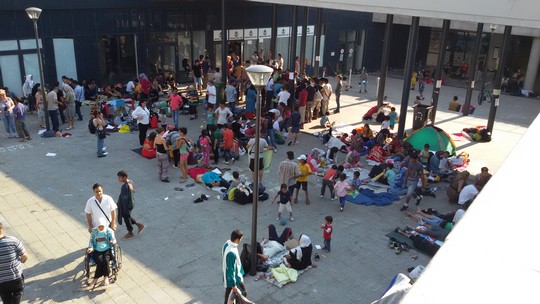At the central station in Budapest, blankets strewn across the floor form the makeshift homes of thousands of asylum seekers. Most are trying to get to Western Europe by any means necessary, but all paths are blocked. ‘Whoever helps us, we’ll be grateful to them for generations. And if help comes from the Israeli people, that would signal a new beginning for our two nations.’
By Shahar Shoham (translated by Gila Norich)
BUDAPEST — The refugee “crisis” in Hungary is making headlines the world over, especially following the discovery last week of a truck containing the bodies of dozens of refugees who died of asphyxiation. Most refugees arriving in Hungary treat it as a stop, part of a longer journey to Western Europe. Thousands are taking temporary shelter in one of Budapest’s three main train stations. It is believed that the truck in which the bodies of the 71 asylum seekers were found had left one of these stations, Keleti, before being discovered a day later on the Austrian side of the border. On Tuesday morning, at the central station in Budapest, Hungarian officials suspended trains bound for Austria and Germany for several hours.
Those arriving at Keleti station, the largest of the three, would think there had been a ruckus over nothing. Like most European central train stations, all that is seen from the outside is an impressive, ornate building. But a few more strides toward the station reveals something else entirely. Downstairs, in a kind of well or atrium just below street level, I see thousands of refugees, thousands of blankets, tents, women, men, children running around. There is a strong stench, disorder, and confusion. Classic Europe high above; chaos lying just beneath it.
The lower level of the train station links directly with the entrance to the underground metro station. Tourists leaving the train station unexpectedly run into the refugees, and I watch their mouths drop in astonishment. Some pause for a second, trying to process the images before their eyes. A few backpackers stop to play with the kids, their packs still strapped to their backs. Most continue on, whether to the wine festival in the plaza of the big cathedral, or simply to wander by foot the city recently named “one of the friendliest” in the world.
No one knows what will happen
The activities being carried out by Migration Aid, a group of Hungarian volunteers who came together via Facebook, is the only visible assistance being given on site. A caravan of Hungarian volunteers with bags emerges from a door, which itself leads to a back room or storage closet. I steal a glance and see tall piles of clothing, diapers, bottles of water and food. Every few minutes a volunteer carrying a straw picnic basket comes out to distribute items. Despite the person’s good intentions, the small basket appears almost grotesque in view of the thousands dwelling in the basement and in need of assistance.
Uncertainty looms. According to one of the volunteers, “everyone is waiting, no one knows what will happen, where they’ll go, no one knows anything. In the meantime, we are trying to help with what we have. We have not received any government support.” Next to where I am standing, two women spread blankets, delineating the space where their families will spend the night.
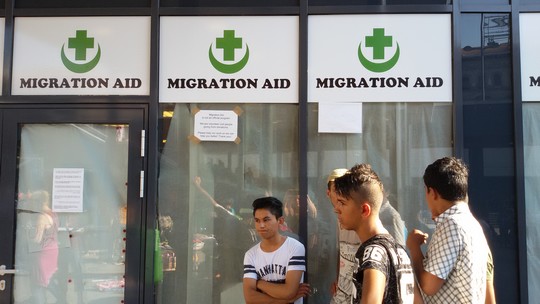
I ask a man from Bangladesh whether he speaks English. With a glance, he motions toward two Eritrean ladies sitting beside him on the stairs. In contrast to the other refugees, these two are not with a group, nor are they sitting with their families on blankets delineating temporary territory. Instead they sit hunched over a large backpack nestled between one of the woman’s legs. The two women are all alone, among thousands of people and the din.
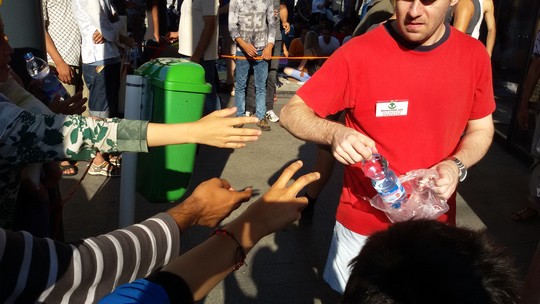
“We are two sisters from Eritrea,” they tell me. “A” was holding her three-month old baby. Her sister is eight months pregnant. They arrived with their husbands to Greece by sea after fleeing Eritrea. “The situation in Greece was terrible,” “A” tells me. “We couldn’t find food. We had to sleep in the street. There are no shelters. No one is able to help others, not even other refugees.” From there, the two families continued by truck to Macedonia. “It rained and they didn’t even help the children.” In Serbia, their next stop, “A” describes, “I felt like everyone was scared of us. But we’re not criminals. We turned into migrants, no one plans to be a refugee.” From Serbia they entered Hungary where they paid traffickers 500 Euros each to take them to the Austrian border. “They separated the men from the women and loaded us onto different trucks. Our truck was stopped by Austrian police and sent back to Hungary.” With tears in her eyes, she mentions that they haven’t heard from their husbands since.
They were sent back to Hungary and spent two weeks in a refugee camp, “A” calls it “jail.
They freed us after two weeks and handed us papers valid for the next 24 hours only. We don’t even understand what’s written on them. The papers have enabled us to get here, to the train station in Budapest. When we left the jail, we didn’t know where to go or what to do. They didn’t explain anything to us. The police just said, ‘go go.’ We saw a lot of other refugees heading towards the train station and we simply followed. After some time, the captain of the train ordered us all off. Now we’re here, waiting, we don’t know what will happen to us. We don’t know where our husbands are, whether they’re in jail, or whether they’ve made it to Austria. Upon arriving in Budapest a few hours ago we walked around hoping to find a place to spend the night. Every hotel asked for our passports and documents, but we don’t have any, so they won’t allow it. We are stuck here. We don’t know where to go. My baby has a cold. How will we sleep here tonight?
She hands me a crumpled piece of paper, her husband’s telephone number scribbled on it. We try to call him with Viber, but there is no answer. “He’s definitely in jail.” Then with tears in her eyes adds, “They took mine as well when I was there – in jail.”
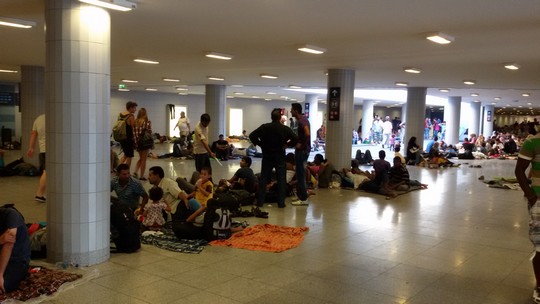
Why won’t they let us leave Hungary?
Only one policeman is seen patrolling the area where the refugees are lying strewn out on the basement floor. Additional police guard the entrance of the main train station. Hungarian citizens and tourists are allowed to pass. The refugees are stopped, made to wait behind the barrier in an area that is unclear who has claimed it. A clear boundary is drawn separating who can move freely among the streets of Europe, and who cannot.
Suddenly a demonstration takes shape. Children and parents hold signs calling on Germany to help. They begin singing in unison, “Germany, help us, Germany!”
On one of the hundreds of blankets sit three Syrian brothers, all above 40, all from a small city near the Turkish border; with them, a young Palestinian-Syrian. “I’m from Haifa, a ’48 Palestinian.” Each of the brothers has between three to four young children. They fled Syria a month ago and arrived at the train station in Budapest a few days ago. Since arriving, they have been sleeping on a small piece of cloth, surrounded by thousands of others. “Welcome to our home in Budapest. We are sorry, we don’t have any coffee to offer you,” says one of the brothers, and invites me to sit with them on their open blanket.
The oldest brother is a doctor, a hematologist. Since arriving at the station, he mostly helps the volunteer doctor at the station – though mostly with translation – and offers a listening ear to refugees in medical distress. “I am 43 years old,” says the doctor. “I don’t need money, or food. I don’t want anything. We fled for our children’s, our babies’ sake. For the sake of their future.”
“Syria is buried underground,” says the second brother. “Do you know that Syrians make up only about 15 percent of the refugees here at the station? The rest are from Bangladesh, Afghanistan,” the other brother adds, “but we are all poor here, we’re all in the same situation.”
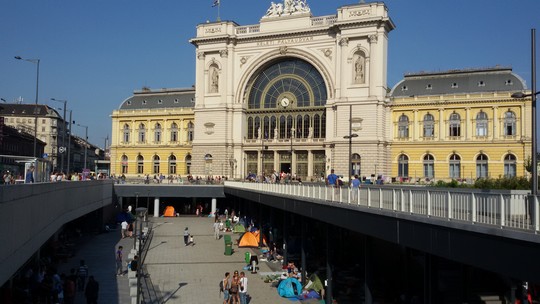
They arrived in Hungary after traveling through Turkey, Greece, Macedonia, and Serbia. They spent five days at the Macedonian border. “People cut the fence in order to pass. The police fired gas at us, like the Syrian Army.” They took buses and trains. In Belgrade they stopped to change clothes and take a shower using water from a sink. “They were good people there, they wanted to help us. In Greece they also helped us. They gave us water, welcomed us. Our problem is not with the people, it’s with governments. But we had nothing to do there. We want to get to Germany. There’s a future for us there. This isn’t Europe. We want to get out of this country. Here wives and children sleep in the streets.”
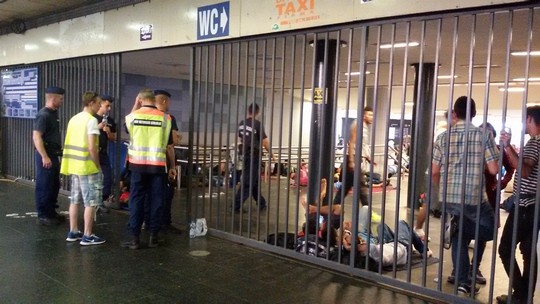
“Why aren’t they letting us leave? Hungary is a poor country. Why do they keep us here? One of the brothers asks, answering in the same breath. “They want us to stay so that the government receives money from Germany and the UN to deal with us. It’s all about money. All the governments of the world are corrupt. We want there to be democracy in Syria. Once that happens we will be able to go back. Our parents are there, they’re in their 90s. They stayed. We want democracy, we want everyone to feel free to express their opinion. Anyone else is better than Assad, ‘our lion,’” he says ruefully.
The ‘infiltrators’ have reached Europe
“You know, Israel and America are strong,” he continues. “If they say, ‘it is possible to end this dirty war.’ If the Israeli people — not the government — the people, insist on helping us, as neighbors, it will bring change. If they talk about it on Channel 2 — which we know everyone watches — there is a possibility. Those who help us out of this mess, we will be grateful to them for generations, and if it’s the Israeli public, it will signal the possibility for genuine change between our two nations. It’s important for me to say this to Israelis: it is possible to build a new future together.”
“Think what it would be like if one Israeli found himself sleeping in the street with his children. The whole world would be appalled because Israel is a democratic country,” he says. His brother adds, “but a democracy primarily for Jews.” “Enough about Israel,” interjects the other brother. “The problem is here, in Hungary. We have to get out of here. Tomorrow. I didn’t flee Syria in order to get a sandwich from a volunteer in a Budapest train station. I fled for the sake of my kids. To save their lives.”
From the distance of several streets, an Israeli couple from Tel Aviv exits the station. After exchanging a few words, the man asks me, “did you see all the infiltrators over there in the station?!” Why isn’t anyone helping them? In Israel we also need to help out!” His remark instantly makes me think about the ways in which the [Israeli] government’s lexicon of incitement has seeped into the Israeli household, turning into the only words Israelis know to use with regard to refugees. Despite Europe’s great failure to provide adequate care and advance new policies that will provide protection to those in need, at least it is clear to everyone there that they are dealing with refugees. Only in Israel are they still called “infiltrators.”
Shahar Shoham has been active in advancing the rights of migrants, refugees, and other undocumented persons in Israel through her work with Physicians for Human Rights-Israel. She is currently completing an MA in Global Studies through a consortium of various universities around the world. This article was first published in Hebrew on Local Call. Read it here.

